4 Cents Review – When 2 reviewers each give their 2 cents.
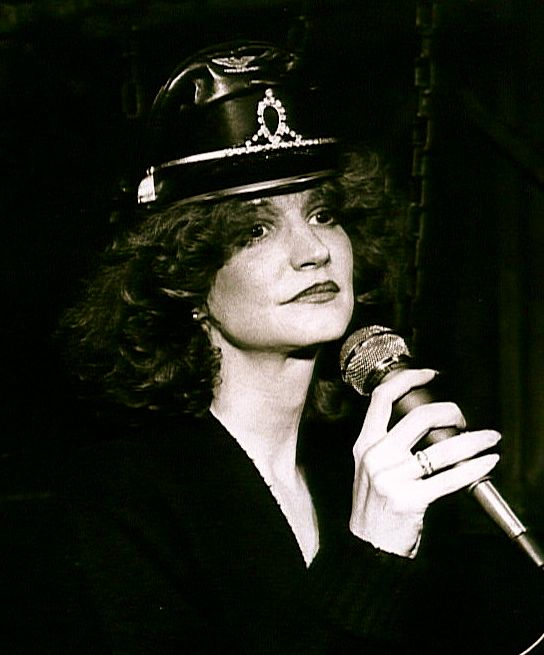
LATE NIGHTS WITH THE BOYS: confessions of a leather bar chanteuse Pictured: Alex Bond in 1977
Today Diánna Martin and Karen Tortora-Lee give their 4 Cents about Late Nights With The Boys: Confessions Of A Leather Bar Chantuse which is part of this year’s Frigid Festival.
Late Nights With The Boys: Confessions Of A Leather Bar Chantuse was presented as selections read by Alex Bond and David Carson from Ms. Bond’s novel, but aside from that we both didn’t know what to expect. The Frigid blurb promised that the reading would transport you to Dallas 1977, a magical time before HIV/AIDS, but not before ignorance and prejudice so we were eager to watch this story unfold.
Karen: I really didn’t know what to expect from Late Nights With The Boys, and almost immediately I was charmed. Didn’t you sense their warmth right away?
Diánna: Absolutely – there was something very natural and calm about Alex Bond and David Carson that affected the audience. I think the fact that they didn’t dim the house lights was interesting toward that end …
Karen: Definitely. I mean, I felt they were having a conversation with us (the audience) as much as with each other, and that sense of immediacy happened automatically.
The story begins with Anna Zander interviewing prospective autobiographer Craig to see if he would be a good fit, not only as someone who is a good enough writer to capture her story, but if he’s someone she’ll feel comfortable with so that her story will be able to come forth naturally.
Karen: First of all, I loved how Anna greeted Craig at her front door with “Are you gay? Come on in … but only if you’re gay” because it set a tone for the piece right away.
Diánna: Yes! It did – it got everyone laughing, but it also let you know, as an audience member, kinda what you were in for … and you immediately got a sense of who her character was.
Karen: Which is so important because on first sight she’s anything but, to put it bluntly, a fag hag so it was even more endearing when she says it right up front with all her southern charm.
Diánna: Right? It really was – and it was done so simply. Really truthful honest choices were made in the acting by both actors, so we got to see them as the people they were – and not caricatures. It would be easy to fall into that trap with this play if they were actors who were “acting”.
Karen: I agree. I think Craig said it best when he said of Anna, “She was a great lady AND trailer trash. HOW did she do that?” Because of course you knew exactly how he meant it when he said it. It was said with love and got a great response from the audience . . .
Diánna: EXACTLY.
Karen: It showed that she was elegant AND spunky . . . that she could be wicked and had no problem bringing that side of herself out. This way, when it starts becoming revealed that this genteel southern lady was a leather bar chanteuse, it’s not so inconceivable anymore.
Diánna: Absolutely – because despite the southern belle aspect, she is more an independent woman who has these different sides to her that are all so interesting. You totally buy it and that’s even if you don’t have any idea of what you’re seeing …I went in blind about some things – and still went with it – but more on that later.
Karen: Right, you absolutely buy it, because as Anna takes you on her journey you can see the wide-eyed innocent she once was, and you can see all these defining moments that she was open too, these things that maybe other girls of her social circle might have been shocked by and would have turned away from.
Instead, she embraced it all, and by doing so, she widened her mind, and her world, and suddenly it makes so much sense to see the woman you see before you with all her gentility and her wickedness at once.
Diánna: Yes! You see her transformation that was fed by being surrounded by people who cared about her…and despite the stigma that a lot of people, regardless of their point of view, have about homosexuality, would not be able to deal with, she was not concerned with any of that. She opened herself to it all – because it came from such a positive place.
Sitting there watching it and hearing her relive her tale reminded me of myself when I was living in St. Louis. It really took me on a trip down memory lane, and I think that’s something that really strikes a note with the audience – going back to the comfort level the actors create – because most people coming to see the play will know a little about it from the title; and in doing so, might very well have an experience of their own that is comparable – their “first time.”
Karen: It’s so true. As Anna was describing her first time in a leather bar, all wide eyed and innocent, so sweet and naive, I remembered all those days of being 18, 19, and going to gay bars here in New York City for the first time with my friends who were just coming out. It was all so different and exciting, and quite frankly, it really was much more of a bonding experience than just going to a sports bar with “regular” guys. I have nights from 20 years ago that I remember more vividly than what I did last weekend!
I think many others will be doing what we did as they watch this show – going down memory lane!
Diánna: Oh, absolutely. I think that’s what also allows for such an emotional connection between the actors and the audience. I mean, here you have two people reading mostly descriptions that are out of a novel, really, with dialogue between them, of course, but still some of that was even done in the third person. The ability for them to hold us in the palm of their hand like that was amazing – for the audience to really be there with them. And I think so much of it has to do with the fact that the audience becomes so involved because they are reliving their own experiences. I saw many heads nodding and people dabbing their eyes…I know I wasn’t the only one!
Karen: I was too! It really struck a chord, especially when she started talking about some of the sadder aspects.
Diánna: And the descriptions – of the bar, of the people – it was all so vivid. It was amazing – and again, being done in the third person makes it so important that it was so rich in the way it painted the picture so that we would remain engaged. I have not been that affected by a reading in some time.
Karen: And I’m glad it was all inclusive, because while her joyful times were fun and funny, her journey really had tinges of sadness too. As she said, “carefree was replaced with caution and cadavers” and I think that’s the crux of this whole story. That she is not just that she was a naive girl who got some education about the leather bars and the underground gay scene of 1977.
Diánna: Absolutely!
Karen: But that she also unfortunately had to then bear witness to so much sadness, starting with seeing (or hearing about) her dear friends being gay bashed, and continuing on with watching her friends fall away one by one: all victims of an epidemic which swept through the early 80s and claimed so many beautiful souls.
Diánna: I really appreciated the way that was laid out. The AIDS epidemic was mentioned/hinted at very early on and we knew that she had lost the myriad of friends she had lined in picture frames. And intermingled in the funny moments or the excited revelry, a small hint would be dropped again. But the main sad point, that was discussed for its own scene was the gay bashing – which was so sad, and made many of us cry in the audience; but the show, instead of taking an easy way out and going through a scene where she’s at a friend’s bedside when they’re dying of AIDS, she chose to focus on how incredible they were when they were alive – and so when they are talked about as dead, there is even so much more of a void, and it strikes home – without going over the top or getting sappy – where it could have.
Karen: That’s right. It’s one thing to talk about someone who’s dead … it’s another thing to talk about someone as if they were still alive … to see the gleam they still manage to produce in someone, to see that effect on someone makes their passing all the more poignant. It’s true. And whenever Anna spoke of her friends, you could see the years melt away, and she looked so much like a young girl again. That’s not just the power of acting. That’s the power of one person’s mark on another person, and like you say … the obviousness of that void is then just so much more heart wrenching.
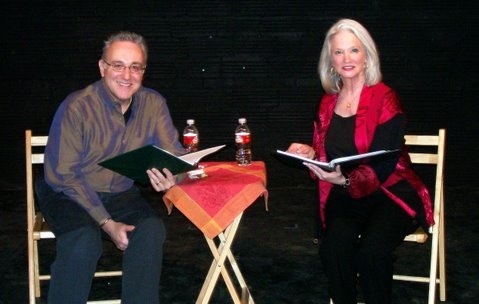
David Carson and ALex Bond in DFW Fringe Festival
Diánna: I wanted to also make note about David Carson’s performance – the same way that we saw in Alex’s face the joy and love that she had for those friends that she had lost, David had such a personalization in his love for her character. It really was just so lovely – it made me smile.
Karen: It’s so true. I think there’s a lot of nuance that would be lost without him; he’s got a tough role … he’s got to be the straight man (well, the gay straight man!) but the truth is, if this were just a one woman show I’m not so sure it would have played as well. They both come alive in each other’s company … and the story itself is so much about how people affect you and come into your life and rearrange you … that to do this piece solo wouldn’t have worked. So I agree, David does some of the hardest work in this piece, sometimes by simply letting Anna (and Alex) shine. He’s like the light that illuminates her.
Diánna: Well said – it really is a piece that makes for the characters to have a symbiotic relationship, and they do indeed feed each other, both to the actors and characters as well as the audience. Now, what is the history behind this? Is this an autobiographical tale that was a book, made into a play about a book?
Karen: Yes, there’s even a part in the beginning of the show where she’s talking to the man who’s about to write her book and says “lets write it in the 3rd person” and I think that’s why the play is about “someone else”.
Diánna: Ahhh…yes, that’s true. So they have written that in there so it just falls naturally.
Karen: Which is very magical in some ways, to take your life and hand it over.
Diánna: I suppose that was the decision to do it as a “reading”, instead of trying to bring it out as a staged piece – it wouldn’t have worked, trying to re-create her life as staging. The magic happened in a much subtler fashion.
Karen: Right, so unexpected. You don’t expect it to come to life as much because you’re expecting to hear someone reading a biography. Then, everything falls away and suddenly you’re transported, because the story is so powerful, and charming, and wonderful.
She really is a bit like Dorothy or Alice or … who else?
That chick in Narnia? … Going through the other side of the closet!
Diánna: Hahaha right!
Karen: Since back then everyone was still IN the closet, so the only way to understand the gay world, was to go INTO the closet!
Diánna: Very much like Alice. There is very much a fable/fairy tale thing going on – they even talk about that.
Karen: It’s nice to think that this is what Alice would be like grown up, telling her story to someone else of this time.
Diánna: All the leather and glitter; the trapeze and the world of queens, princesses . . .
Without a doubt, anyone who is interested in seeing the story of a young woman entering a world of unexpected delights and unimaginable experiences, but with a grown up twist, should then go see Late Nights With The Boys … it will transport you to a never-never-land of fairy tales.


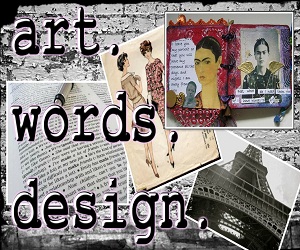
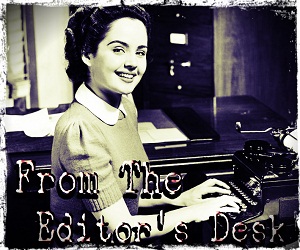

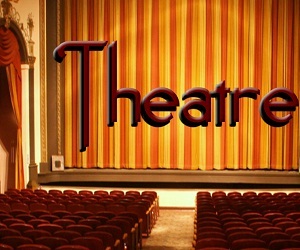

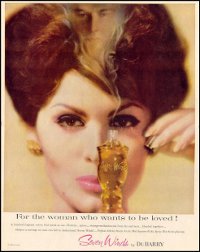
{ 0 comments… add one now }
{ 1 trackback }